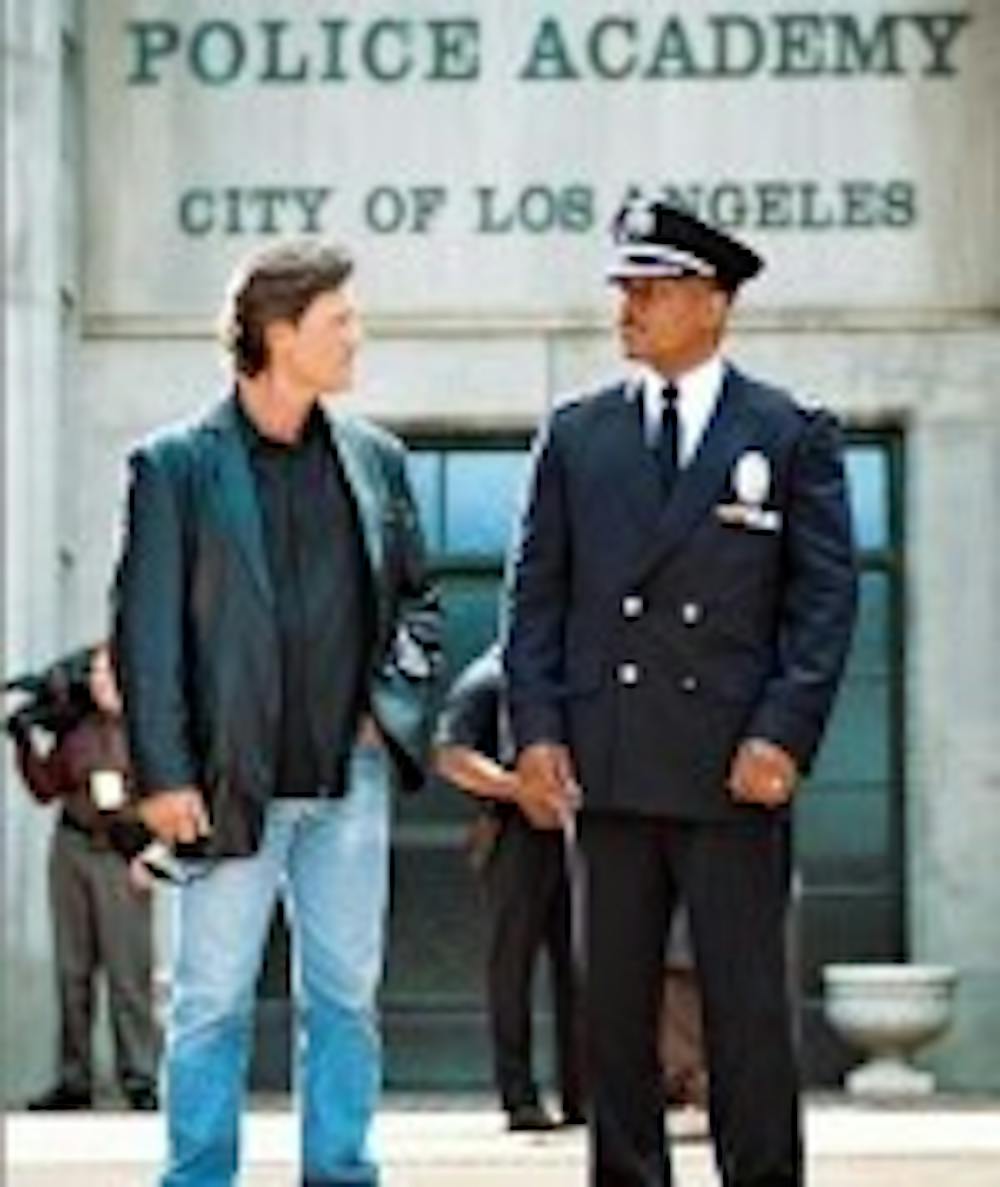One hour before a verdict is ready to ignite Los Angeles in flames, Sergeant Eldon Perry is dazed in his bedroom, with a half empty bottle of whiskey on the nightstand. Standing disheveled in his boxer shorts, Perry could use a shave, but he is too tense from watching the local news broadcast. According to the reporter, the jury is ready to decide the fate of four Los Angeles Police Department officers.
But the audience already knows what will happen. As Perry, a corrupt L.A.P.D. officer, told his partner before, "They get off - it's the summer of '65. They get off - this city burns."
Most news articles indicate that the Los Angeles riots, kindled by the acquittal of four white police officers after the beating of Rodney King, serve only as a backdrop to Ron Shelton's engaging, racially tinged police drama, "Dark Blue." In fact, any reference to the riots, or even the 1992 time period, is purposefully removed from the trailer.
The logic is that audiences do not want a history lesson, but Kurt Russell, who plays Sergeant Perry, duke it out with Ving Rhames and scream, "The only reason this city's here is because they built it! With bullets!" while P.O.D.'s "Boom" plays in the background.
Perry's referring to a generation of cops before him, officers like his father who was killed during the 1965 Watts Riots. Although Shelton indulges the audience in a marginally interesting police investigation involving a quadruple homicide at a Korean grocery, the most fascinating moments reflect the history itself. While "Dark Blue" doesn't offer the most incisive retelling of the L.A. riots, what's important is that the story is told at all.
Pre-riot tension is hammered in with the story of Perry, a cop who sees nothing wrong with using less-than-circumstantial evidence to pin murders on perps - or shooting unarmed ones and covering it up in the process. And he's spreading his dirty lessons to his partner Bobby Keough (Scott Speedman), who he helped to clear from a questionable shooting incident.
Perry's not a nice guy, but it won't necessarily stop viewers from rooting for him in certain circumstances. The last time audiences saw Russell In Los Angeles was as Snake "Your rules are really beginning to annoy me" Plissken in "Escape from L.A." Like Snake, Russell makes Perry into an appealing presence, despite his character flaws. In "Dark Blue," the comparison is akin to "All in the Family's" Archie Bunker; he's everyone's favorite bigot.
Leaning against him is Deputy Chief Arthur Holland (Rhames), who is investigating the corrupt practices of Perry and his boss, Jack Van Meeter (Brendan Gleeson). Meeter - more or less - stands in for Darryl Gates, the white L.A.P.D. chief scrutinized for his role (or lack thereof) during the riots. Shelton's loose reconstruction of history deserves some commendation.
Rhames's vigilant presence as an officer who vows to "swoop down with the Lord's fury" on crooked cops is evident far too little in the film. Instead, "Dark Blue" often boils down into a police chase involving the semi-amusing adventures of Perry and Keough.
Thus, some have panned the film as a remake of "Training Day" minus Denzel Washington. The comparison is not unfounded; David Ayer is the screenwriter for both films. Although Washington had the standout role, "Training Day" is remembered most for its tempo. As the distinction between right and wrong blurred in the 2001 film, audiences related more to Ethan Hawke, the junior partner morally unraveling through the progression of the day.
In that sense, "Dark Blue" is a paler distillation of "Training Day." Ayer's script sometimes tries too hard to make points and in some moments, it allows Russell to go off in several long-winded rants.
And he doesn't hold back in letting you know that Perry is a bad, bad dude. Certain exploits of his, such as blackmailing Holland with dirty pictures of him with another woman, come off as strained attempts. But, as revealed by the audience's laughter, it's difficult to dislike a man who exhibits this reaction after finding out his son is dialing 1-900 numbers:
"At least he's not a fag... The boy's finding his dick."
More often than not, you want to laugh with the guy, not condemn or cry for him. But just desserts are served at the end when Perry is chasing down the grocery store murderer in his car - right in the middle of South Central, L.A., in the outbreak of the riots.
And this is the point when the dissimilar elements of emotion and education fuse to a dramatic level. It comes from tension of wondering if Perry, bombarded in his sedan by bricks, will make it out alive. But at the same time, viewers will wonder whether Perry deserves to have a crowd full of brothers beat him to a pulp. He is, in the end, a part of the problem.
Ideally, Shelton places the ambiguous solution in a wary, but determined Chief Holland. While observing the work cut out for him in the coming days of the riots, Holland surmises, "It's going to get ugly before it gets pretty."
Upon witnessing Los Angeles in flames at the close of the film, "Dark Blue" reminds the audience what happened over a decade ago that allowed the situation to become ugly in the first place.





